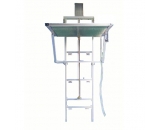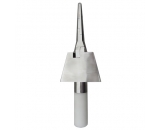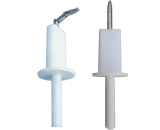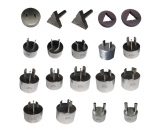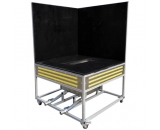希腊罗马神话和《圣经》中的英语典故5
17.The Apple of Ones' EyeThe Apple of Ones' Eye的字面意思是“某人眼里的苹果”,在这里,apple指的是the pupil(瞳孔,眼珠),大概因眼珠圆的象苹果之故。瞳孔是眼睛最重要的部分,失去瞳孔,光线就无法通过虹膜中心的圆孔进入眼内而变成了瞎子。所以,这个成语常用来比喻象爱护眼珠一样爱护某个最心爱的人或珍贵的东西,即表示a cherished person or object;sth extrmely precious to one; sb dearly loved等意
这个成语来字《旧约。申命记》(Deuteronomy)第32章“耶和华遇见他在旷野荒凉、野兽吼叫之地,就环绕他,看顾他,保护他如同保护眼里的瞳人。”在圣经其他地方也有类似的话。英文版《旧约。诗篇》(Psalm)第17章有这样的句子:"Keep me as the apple of the eye,hide me under the shadow of the wings"
成语the apple of one's eye是固定结构,不得写成the apple of the eye of…的形式;在搭配上,它常与动词be,keep,care for等连用。按其想象意义,它与汉语成语“掌上明珠”颇相似,但其比喻的对象较汉语“掌珠”更广,因“掌珠”通常指心爱的女儿,而不能用与其他场合。
eg:Little Mary is the apple of her father's eye
Mind the reputation of your school as you care for the apple of your eye.
18.The writing/Finger on the Wall不详之兆;大祸临头
这个成语的字面意思是“墙上的文字(或手指)”,而实际含义是a sign or warning of impending disaster(迫在眉睫的凶兆);a sign that sth bad will happen; a feeling that ones number is up;等等。其语言外壳与内涵是怎样联系起来的呢?还是出自《圣经》
据《旧约。但以理书》(Daniel)第5章记述:有一次古巴比伦(Babylonian)的国王伯沙撒(Belshazar)正在宫殿里设宴纵饮时,突然,不知从哪里出现了一个神秘的手指,当者国王的面,在王宫与灯台相对的粉墙上写西了四个奇怪的单词:MENE(弥尼)、MENE(弥尼)、TEKEL(提客勒)、UPHARSING (乌法珥新)。国王张皇失措,惊恐万分,谁也不懂墙上所写的字是什么意思。后来叫来了被虏的犹太预言家但以理,才明白了这几个字的意思就是大难临头。他说:“弥尼就是上帝已经数算你国的年日到此为完毕;提客勒就是你被称在天平里显出你的亏欠;乌法珥新就是你的国分裂,归与玛代人和波斯人。”果然,当夜伯沙撒被杀,又62岁的玛代人大利乌取而代之。
依次,“墙上的文字(或手指)”就表示身死国亡的凶兆。英语中这个成语有几种表达方式:the writing/handwriting on the wall或a finger on the wall,通常与be,like等系动词连用;有时写成see/read the writing on he wall的句型,表示提出警告,such as :Don't you see the writing on the wall, 有时候也可省略on the wall,只说Don't you see the writing?意思也是一样的。
eg:This inexplicable incident seemed,like the Babylonian finger on the wall,to be spelling out the letter of my judgement...
In this house of his there was writing on every wall.His business-like temperament protested against a mysterious warning that she was not made for him.
John's emplyer had less and less work for him;John could read the writing on the wall.
The writing on the wall is clear:if man behaves like an animal and allow hs population to increase while each nation steadily increases he coplexity and range of its environment,nature will take her course and the law of the Jungle will prevail.
When Bill's team lost four games in a row,he saw the handwriting on the wall.
19.Not an iota of没有一点点,丝毫也不
iota是希腊字母表中第9个字母“I”的名称。not an iota of 出自《新约。马太福音》第5章:“律法的一点一画都不能废去,都要成全。”因为iota是希腊字母表中最小的一个字母,它有时可以写作一短横置于其他字母之上;遗漏这一点点对发音并无什么影响,只按规则不能减少而已。《福音书》所说的律法,系指“摩西律”,意即无论何人都不允许随便废去这戒律哪怕是最小的一条,甚至其中的一个字母,一个小小短横也不得更动或遗漏。
由此,在语言中遗留下来这个成语,转义表示not a bit of ;not one jot or little;not at all等意思。iota在这里,相当于汉语“小不点儿”的意思。
Eg:Science deals with things in a practical way.Science means honest,solid knowledge,allowing not an iota of falsehood,and it involves herculean efforts and gruelling toil.
There is not an iota of truth in the story.
20.The Salt of the Earth社会中坚;民族精华;优秀份子
The Salt of the Earth这个成语,字面意思“世上的盐”
盐是饮食中不可缺少的调味品,人体若缺盐,健康就会受到影响,出现种种疾病。盐还有杀菌、解毒、消炎、除污等多种功用,它既是“百药之王”,又是工业之母,确是值得珍视的东西。在许多民族的习俗汇总,盐被当作敬客的高贵礼品。
The Salt of the Earth一词出自《圣经》,据《新约。马太福音》(Matthew)第5长记载:耶稣对他的门徒说:"Ye are the salt of the earth:but if the salt have lost his savor,wherewith shall it be salted? " 在这里,salt用于转义,表示flavor;of the earth即of the world。这是耶稣登山垂训论"福",所讲福音结尾的话,他把门徒比做“世上的盐”,这是极高的称赞。这句话在后世不断引用变成了一个典故性成语,转义为the most valuable members of sociey;the finest type of humanity;a person or a group of people having the best character 之意
eg: He does a lot of good jobs and is considered to be the salt of the world.
You all are the salt of the earth.Our hope is placed on you
21.Cast pearls before swine对牛弹琴;白费好意
To Cast pearls before swine的意思是“珍珠头在猪猡前面”。
swine是个旧词,书面词,即今为pigs,不过swine单复同行,本句为复数。
这个成语源自《新约。马太福音》第7章:“Give not that which is holy unto the dogs,neither cast ye your pearls before swine,lest they trample them under their feet,and turn again and rend you”.由于to cast pearls efore swine,比喻确切,在后世不断引用中而成为一个国际性成语,常用来表示to offer sth valuable or beautiful to those who can't appreciate it;to give what is precious to those who are unable to understand its value等意思,含有轻蔑嘲笑色彩。按其字面意义,这个成语与汉语成语“明珠按投”相似,但是寓意不同,基本上不对应;按一比喻意义,它相当于“对牛弹琴”,“向驴说经”“一番好意给狗吃”“狗咬吕洞宾,不识好人心”等。
She read them Shakespeare,but it was casting pearls before swine
I won't waste good advice on John any more because he never listens to it.I won't cast pearls before swine.
...and when I let the upper floor to Cap'en Cuttle,oh i do a thankless thing,and cast pearls before swine
22.a wolf in sheep's clothing批着羊皮的狼;貌善心恶的人
耶稣在加利利一带传道布教,收了很多信徒。有一天,他对门徒说:"Beware of false prophets,which come to you in sheep's clothing,but inwardly they are ravening wolves"
eg:Mrs.Martin trusted the lawyer until she realized that he was a wolf in sheep's clothing
One who teaches morality and practises immorality is a wolf in lamb's skine
23.separate the sheep from the goats区别好坏,分清良莠
《新约。马太福音》记述:“And before him shall be gathered all nations:and he shall separate them one from another,as a shepherd divideth his sheep from the goats”
由于《圣经》的影响,sheep和goat在英语中的形象截然不同,前者比喻好人,后者比喻坏人。英语中有关goat的成语,大多贬义。如:to play the goat=play the fool(瞎胡闹);to get sb's goat(触动肝火) ;等等。《圣经》说牧羊人要分辨绵羊和山羊,“把绵羊安置右边,山羊左边”。据说野山羊常混进羊群里,引诱绵羊,故牧养人必须把它们区分开来,以免混淆。
由此,人们用to separate the sheep from the goats这个成语,来比喻to separate the good from the wicked; to divide good or useful people from bad or useless
eg:We'll go through the list of members,and separate the sheep from the goats
Have faith in me,please.I can separate the sheep from the goats 为什么不搞成压缩文件呢?
页:
[1]
